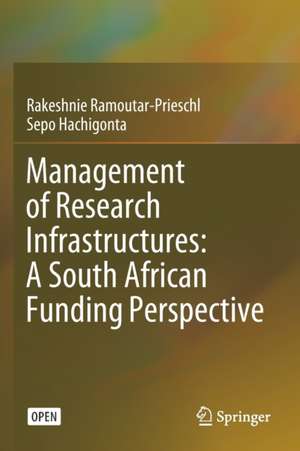Management of Research Infrastructures: A South African Funding Perspective
Autor Rakeshnie Ramoutar-Prieschl, Sepo Hachigontaen Limba Engleză Paperback – 18 sep 2020
This open access book provides an overview of the building blocks necessary for managing, steering and guiding the establishment of a research infrastructure (RI). It offers valuable insights into RI investment, access and management at the academic, grants management, agency and policy level, and serves as a useful guide for the research community, students, and those in the private sector wishing to understand the approaches and opportunities involved in the establishment, maintenance and management of research infrastructure platforms. Presenting a holistic view of RI investment and granting cycles from a South African perspective, the book’s target audience includes those working in science diplomacy, policymaking and science grants councils (especially in Africa) as well as funders and donors.
| Toate formatele și edițiile | Preț | Express |
|---|---|---|
| Paperback (1) | 411.75 lei 6-8 săpt. | |
| Springer International Publishing – 18 sep 2020 | 411.75 lei 6-8 săpt. | |
| Hardback (1) | 418.83 lei 6-8 săpt. | |
| Springer International Publishing – 30 ian 2020 | 418.83 lei 6-8 săpt. |
Preț: 411.75 lei
Nou
Puncte Express: 618
Preț estimativ în valută:
78.79€ • 85.85$ • 66.39£
78.79€ • 85.85$ • 66.39£
Carte tipărită la comandă
Livrare economică 23 aprilie-07 mai
Preluare comenzi: 021 569.72.76
Specificații
ISBN-13: 9783030372835
ISBN-10: 3030372839
Pagini: 103
Ilustrații: XX, 103 p. 27 illus., 25 illus. in color.
Dimensiuni: 155 x 235 mm
Greutate: 0.19 kg
Ediția:1st ed. 2020
Editura: Springer International Publishing
Colecția Springer
Locul publicării:Cham, Switzerland
ISBN-10: 3030372839
Pagini: 103
Ilustrații: XX, 103 p. 27 illus., 25 illus. in color.
Dimensiuni: 155 x 235 mm
Greutate: 0.19 kg
Ediția:1st ed. 2020
Editura: Springer International Publishing
Colecția Springer
Locul publicării:Cham, Switzerland
Cuprins
Background.- Classification of RI Investment Areas in South Africa.- Process for Awarding RI Grants.- Condition of Grant Award.- Skills Required for Managing Research Equipment.- Monitoring, Evaluation and Risk Management.- The Sustainable Management of Research Equipment.- Conclusion.- Annexures
Notă biografică
Dr Rakeshnie Ramoutar-Prieschl obtained her Doctorate in business management and her Master’s in biotechnology. As an academic, she has lectured, tutored and mentored both undergraduate and postgraduate students. In addition, she has served on various committees including the National Science and Technology Forum Awards and the Nanotechnology Public Engagement Programme, and has served on various advisory boards and steering committees including the Centre for High Resolution Transmission Electron Microscopy. She is a member of the Executive Committee for the Organisation of Women in Science in Developing Countries, and the Chair of the Board of Trustees for Child Welfare South Africa. Rakeshnie previously led the Research Infrastructure (RI) portfolio for over 11 years, as a Director at the National Research Foundation. During her tenure, she has developed a number of policies, strategies and frameworks that has provided the foundation for establishing, nurturingand sustaining a number of RI platforms in the country. She has also worked in vaccine development and has held various management positions including working at the Desmond Tutu TB and HIV Centre. Rakeshnie currently holds the position of Head of Department: Research Capacity Development at the University of Pretoria where she is accountable for the full portfolio of grants support and management as well as strategic interventions for early career academics (ECAs). She has been the recipient of numerous grants to develop and strengthen the track record of ECAs at the University.
Dr Sepo Hachigonta holds a Master’s and a Doctoral degree in Environmental Science from the University of Cape Town. He is currently the Director of Strategic Partnerships at the National Research Foundation (NRF) of South Africa. Sepo’s interests span a number of trans-disciplinary fields, from environmental and agriculture systems, to research policy that impacts the continent’s science, technology and innovation landscape. He has extensive networks with over 20 countries on the African continent, and has contributed in developing systems analysis expertise aimed at addressing current global challenges through various programmes, such as the Southern African Systems Analysis Centre (SASAC) – a multi-year initiative that implements cognisance multi-level systems analysis capacity interventions and a comprehensive approach to policy-related activities in Southern Africa. Additionally, Sepo has been instrumental in spearheading South Africa’s participation in regional and international bodies, including the Science Granting Council Initiative (SGCI), the International Science Council (ISC) and the International Institute for Applied Systems Analysis (IIASA). Prior to joining the NRF, he was a programme manager at FANRPAN, a regional policy analysis network on food security and agricultural based in Pretoria.
Textul de pe ultima copertă
This open access book provides an overview of the building blocks necessary for managing, steering and guiding the establishment of a research infrastructure (RI). It offers valuable insights into RI investment, access and management at the academic, grants management, agency and policy level, and serves as a useful guide for the research community, students, and those in the private sector wishing to understand the approaches and opportunities involved in the establishment, maintenance and management of research infrastructure platforms. Presenting a holistic view of RI investment and granting cycles from a South African perspective, the book’s target audience includes those working in science diplomacy, policymaking and science grants councils (especially in Africa) as well as funders and donors.
Caracteristici
Is the first book to describe in detail the grants management and awarding processes used by funding agencies Shares key insights into awarding, managing, monitoring and evaluating research infrastructure grants Benefits numerous countries in Africa and the developing world in terms of investing in science and research infrastructures
